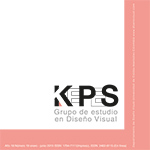Authors
Abstract
More and more the discipline of Design is expected to assume a prominent role as an agent for social transformation in the transition towards a sustainable society. These demands that come from both the academic and the social spheres, and show the need to establish new working synergies with the resilient movements of local communities which pose a fertile scenario emerging from new challenges for the pedagogy of design.
On the other hand, from a methodological point of view the fitting with these movements of social resilience requires an open and participatory design process, that must include communities in a horizontal decisionmaking system, and at the same time offer open design solutions that can grow and adapt following the evolution of the changing needs of these communities.
Within these premises, the case of a communications design project carried out in collaboration between a group of design students of Escola Superior de Disseny i Arts Plàstiques and the self-managed collective that dynamizes the project of urban agriculture and organic community named Espai Quiró in the neighborhood of la Salut (Barcelona) will be studied.
Both the work of the community managing the space and the intervention of the students participating in this pedagogical experience, responded to a model of design committed to citizenship and neighborhood associations, led by citizens themselves, that overcame the dominant models of behavior and participated in the idea of transition to a new alternative way of living in the cities: with a more unhurried and sustainable rhythm of life advocating collaborative work and empowerment of the associative network of the neighborhood and a re-appropriation of public pace by local communities.
Keywords:
References
Bennett, A. and Vulpinari, O. (Ed.). (2011). Icograda Design Education Manifesto 2011. Treviso, Italy: Grafiche Tintoretto.
de Miguel, F.M. (1993). La IAP un paradigma para el cambio social. Documentación Social, 92, 91-108.
Hopkins, R. (2008). The transition handbook: From oil dependency to local resilience. Cambridge, United Kingdom: UIT Cambridge LTD.
Irwin, T. (2015). Transition Design: A proposal for a new area of Design Practice, Study, and Research. Design and Culture, 7 (2), 229-246.
Irwin, T. et al. (2015). Transition Design. Recuperado de http://design.cmu.edu/ sites/default/files/Transition_Design_Monograph_final.pdf.
Merino, L. y Raya, E. (1993). El método de la investigación-acción participativa como mediación entre la teoría y la práctica de la formación del/a trabajador/a social y en el desarrollo profesional. En Seminario de integración teoría-práctica en la formación de los trabajadores sociales. EUTS de Alicante, Alicante, España.
Park, P. (1992). Qué es la investigación-acción participativa: perspectivas teóricas y metodológicas. En M.C. Salazar (Coord.), La investigación-acción participativa: inicios y desarrollos (pp. 135-174). Madrid, España: Editorial Popular.
Pestaña, M. y Alcázar, M.A. (2009). Investigación-acción participativa. En R. Reyes (Dir.), Diccionario crítico deficiencias sociales. Madrid, España: Plaza y Valdés, Universidad Complutense de Madrid.
Raasch, C., Herstatt, C. and Balka, K. (2009). On the Open Design of Tangible Goods. R&d Management, 39 (4), 382-393.
Seyfang, G. and Smith, A. (2007). Grassroots Innovations for Sustainable Development: Towards a New Research and Policy Agenda. Environmental Politics, 16, 584-603.
Spinuzzi, C. (2005). The Methodology of Participatory Design. Technical Communication, 52 (2), 163-174.
Villasante, T.R. (1994). De los movimientos sociales a las metodologías participativas. En J.M. Delgado y J. Gutiérrez (Coords.), Métodos y técnicas cualitativas de investigación en
ciencias sociales. Madrid, España: Editorial Síntesis.

 pdf (Español (España))
pdf (Español (España))
 FLIP
FLIP
 Perfil Google Scholar
Perfil Google Scholar


















